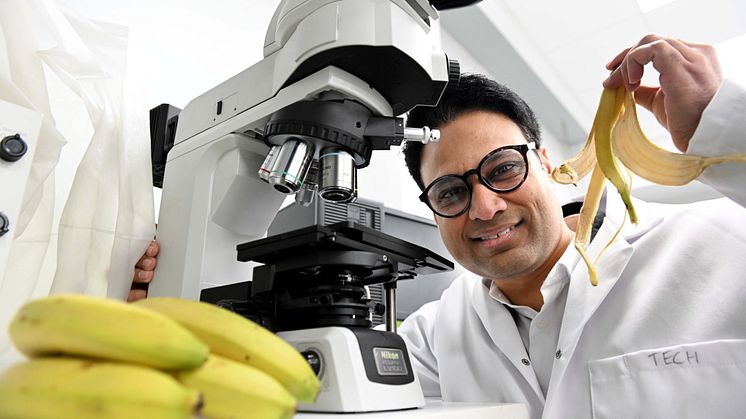
Press release -
Banana waste to be converted to green textiles and energy
Off-grid communities in parts of rural Pakistan could soon have access to a reliable source of electricity for the first time thanks to a new project which aims to convert waste from the banana-growing industry into energy.
Millions of tonnes of agricultural waste is generated in Pakistan every year from growing bananas and other foods.
Academics from Northumbria University have now teamed up with partners in the UK and Pakistan to create a new solution which will make use of this waste product and provide benefits for local people at the same time.
Together the project partners are developing an innovative two-part system – the first part of which will use new technology to convert the banana waste into textile fibres, with the second part taking the waste generated from that process and using it to produce renewable energy.
This will not only reduce the environmental impact of Pakistan’s textile industry, but also bring clean electricity to the 50% of people living in rural areas of the country who live off-grid and currently rely on fossil fuels for energy.
The process has the potential to be applied to almost any form of agricultural waste, meaning it could be used all over the world, benefitting communities and the environment through the supply of renewable textiles and energy.
Entitled, Improving access to sustainable energy inrural Pakistan using food and fibre agro-waste as a renewable fuel (SAFER), the project has been awarded around £300,000 though Innovate UK, the UK’s national innovation agency, through its Energy Catalyst scheme.
Funding through the scheme is awarded to support UK and overseas businesses and organisations to develop highly innovative, market-focused energy technologies that enable energy access in Sub-Saharan Africa and south or south-east Asia.
The project will be led by Northumbria University, in Newcastle upon Tyne; with academics working in partnership with waste-to-energy company Eco Research Ltd, based in Dudley; and the National Textile University, and biogas specialists Prime Eurotech, both situated in Pakistan.
Dr Jibran Khaliq, of Northumbria University’s Department of Mechanical and Construction Engineering, is a material scientist who researches converting waste energy. Discussing the impact of the SAFER project he said: “Pakistan's textile sector is responsible for significant environmental impacts, including greenhouse gas emissions, water pollution, and microplastics.
“Our partners at the National Textile University in Faisalabad have developed a technology to convert banana agro waste into textile fibres, but the lack of electricity in rural Sindh, where the majority of the bananas are grown, has prevented this innovation from being scaled-up until now.
“Over the next year we will be working to develop a new waste-to-energy technology which will convert agro-waste into clean and affordable energy.
“This solution will benefit the textile industry, and local communities, as well as improving soil fertility and food production through the generation of biofertilizers.”
It is estimated that the banana-growing industry in Pakistan produces around 80 million tonnes of agricultural waste every year. This could result in the production of over 57,488 million cubic meters of syngas, or synthesis gas as it is otherwise known, as well as 30 million tonnes of nitrogen-enriched biofertilizers.
Syngas is a man-made gas which is created through chemical processes using waste products. It has a wide range of uses and is recognised as a greener way to generate electricity.
Dr Muhammad Saghir is Director at Eco Research Ltd, and said that collaborating with Northumbria University and the National Textile University on the Banana to Textile Fiber project using syngas will be a groundbreaking journey. He added: “This innovative approach will not only transform agricultural by-products into sustainable textiles but also exemplifies a remarkable synergy between eco-conscious practices and technological advancements leading to local job creation and achieving UK’s net zero agenda.”
The project is funded for one year, but with plans to further develop the partnership and project in the future.
Topics
Categories
UNIVERSITY OF THE YEAR 2022 (Times Higher Education Awards)
Northumbria is a research-intensive university that unlocks potential for all, changing lives regionally, nationally and internationally.
Two thirds of Northumbria's undergraduate students come from the North East region and go into employment in the region when they graduate, demonstrating Northumbria's significant contribution to social mobility and levelling up in the North East of England.
Find out more about us at www.northumbria.ac.uk
--- Please contact media.communications@northumbria.ac.uk with any media enquiries or interview requests ---








